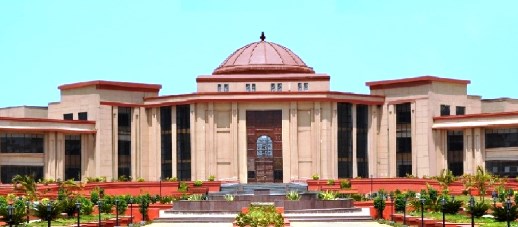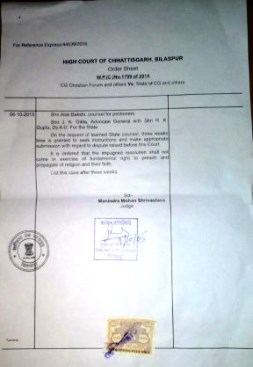
The high court of Chhattisgarh state in central India has asked the state government to ensure that anti-Christian resolutions passed by village councils will not infringe religious freedom.
A Christian organization challenging the local resolutions said the court order is “only a minor relief.”
In July 2014, the village of Belar, in Chhattisgarh’s southeast district of Bastar, convened a Gram Sabha, or village assembly, and passed a resolution banning all non-Hindu religious activities. In all, 54 villages adopted similar ordinances. Chhattisgarh is one of India’s 29 states, in the heart of the country.
The Chhattisgarh Christian Forum a year ago asked the court to strike down the resolutions. In a 9 Oct. ruling made public 14 Oct., the court ruled that “[t]he impugned resolution shall not come in the exercise of fundamental right to preach and propagate religion and their faith.”

The court said it will, in late October, hear the forum’s argument to strike down a section of the state law that the village councils relied upon to restrict religious minorities. Under a 1992 constitutional amendment, states can give local governments more autonomy over various government initiatives, including the management of “social and religious practices.”
“We want the court to set aside Section 129 (G) of the Chhattisgarh Panchayat Raj Act that makes such resolutions legally binding,” forum secretary Arun Pannalal told World Watch Monitor on 19 Oct. from Raipur, the state capital.
“The Court has partially addressed the injustice [meted out] to the Chhattisgarh Christian Community. We believe final order will uphold our freedom,” he said.
However, Pannalal added that “the larger grievance” of a social boycott of Christians has rendered them a “totally ostracised community” in the 54 villages.
Christians, he said, are not allowed to build houses or other structures. They are denied subsidised food supplies and banned from drawing drinking water from public wells. Hindu shopkeepers have been asked to shun Christians and to deny them employment in their fields.
Even if a Gram Sabha passed such a resolution, Pannalal said it would have effect only if the region’s top government officials approved it and passed it on to different government departments. In Chhattisgarh, Pannalal said the resolutions were transmitted to the Vishva Hindu Parishad, or World Hindu Council, a right-wing nationalist organization.
“It is shocking that government officials are working in tandem with a non-state player like [the] VHP,” Pannalal said.
Suresh Yadav, president of the VHP in the Bastar District, told The Hindu, an Indian national news organization, last year that his organisation expects the government to uphold the village resolutions.
“Now that the gram panchayats [village councils] have passed the orders, it is the responsibility of the district administration to implement it; Otherwise, we will protest,” Yadav was quoted in July 2014 by The Hindu as saying.
The Chhattisgarh Christian Forum petition before the high court demands quashing of the clause (129 G) as ultra vires – going beyond the authority granted by the state and a violation of the fundamental freedom of movement, along with freedom of conscience and religion, guaranteed in the Indian constitution.
“It is a draconian law which seriously undermines the spirit of Human Rights declaration,” Pannalal said.